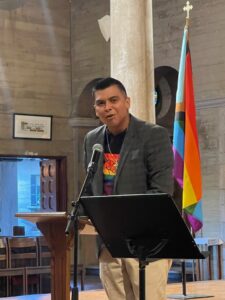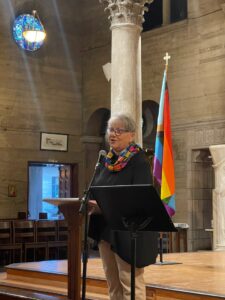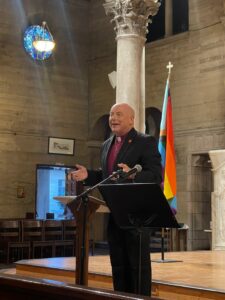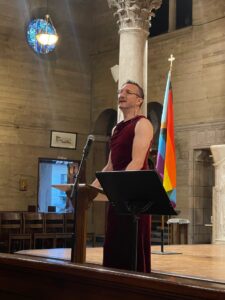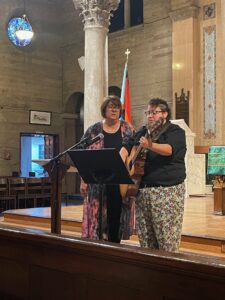Episcopalians from around the Los Angeles diocese hugged and clapped as they sang the civil- rights-era protest song, “Ain’t gonna let nobody turn me around”, at a spirited Oct. 11 National Coming Out Day evening prayer service at St. John’s Cathedral.
The “Evening of Unbinding,” hosted by the Bishop’s Commission on LGBTQ Ministry, celebrated the “beautiful spectrum of the LGBTQ+ community” and a new advocacy, education, justice, community building, and spiritual care diocesan initiative to aid trans and nonbinary people, defying the current political climate.
“The coming out was that this is who I am as a human being,” said Thomas Diaz, commission chair. He recalled the first such celebration, held in 1988, as “a revolution of love, peace, and of unity” and visibility. “This day reminds us that visibility can change hearts, can shift cultures, and make the world safer for those who dare to dream their own life aloud.”
“The Trans Liberation and Flourishing Initiative,” expected to launch in January 2026, deepens the church’s nearly 50-year-old commitment to equality, at a time the trans community is unjustly targeted, said the Rev. Canon Susan Russell, diocesan staff liaison to the commission.
In 1976, The General Convention of The Episcopal Church, meeting in Minneapolis, adopted Resolution A071, which affirmed the gay community’s entitlement “to full and equal claim on the pastoral care, love and acceptance of the church,” she said.
The church “continues to come out” even as federal and state governments restrict gender-affirming care and as anti-gay theologies seem to gain momentum. “We’re here today to say this is not going to happen on our watch; that we as The Episcopal Church have a particular voice, a particular charism, a particular calling to stand in the breach, because that’s what Jesus would do,” Russell said.
The initiative will extend the church’s mission and ministry, “to repudiate heretical nationalism and political scapegoating and proclaim the fundamentally patriotic value of dignity and liberty and justice for all,” said Bishop John Harvey Taylor, who also addressed the gathering.
It’s terrible when a political movement goes to war against any cohort of our fellow Americans,” Taylor said. “It is un-American. It is anti-American. And it is worse when we let it happen without protest. It can only get better if we all stand together. Christ is risen. God is alive. And God’s spirit invites us to stand together with those most at risk.
“Right now, in this time and place, we must center the lives, needs, and leadership of trans and nonbinary people within our diocese and in our neighborhoods.”
Marriage equality may even be threatened and “conversion therapy is back on the table as the heretical nationalists, misappropriating the name of our Lord, try to overturn bans on this inhumane practice state by state. So our work this Coming Out Day is to come out into the streets and join them, as Canon Russell said, in the breach,” Taylor said.
Guest homilist Jonathan Quinn (pronouns they/them), preaching about Jesus’ raising of Lazarus from the grave (John 11:38-44), said they are grateful to have come out, first as bisexual and later as trans nonbinary, although “it’s a scary time to come out or to be out.”
“There’s a lot of pressure, especially on trans people, to stay in the closet or to go back in the closet,” said Quinn. “Our elected officials in both parties frequently use rhetoric that dehumanizes trans people and also attempt to incite violence against us. Support even of gay marriage is decreasing in some segments of society. Each of us must decide how best to meet this moment. Each of us must decide for ourselves. But we must never forget that we are not by ourselves.
“There is a community of LGBTQ+ people who need as many as possible to stand together with us. There’s a generation of queer youth who need their queer elders,” said Quinn, 40.
Prior to coming out, life was like “a tomb, dim, stale and solitary, lacking in… joy, freedom.”
Coming out freed Quinn from “all that had kept me limited and restricted, whether it was harmful views of God or myself or oppressive views of sexuality and gender or others’ expectations of who or how I was supposed to be.
Quinn, who is discerning ordination to the priesthood in The Episcopal Church, added: “I’m passionate about helping everyone find that kind of liberation from whatever is holding them back, whether they’re queer or straight, trans or cis-gender, nonbinary, or woman or man. I’m excited that LGBTQ+ people are increasingly willing to allow ourselves to take up space in the church and to take on lay and ordained leadership roles. We survived a church that, for centuries, would have kicked us out or killed us, but we have always been here.”
Coming out is a decision “that we would not let fear control our lives” or steal our joy, Quinn added. “Sometimes, when I feel afraid, I remind myself why they hate us so much. They hate us because they’re afraid of us. They fear what they cannot control through fear, and they cannot control us. They fear us because we bear witness to the inevitable end of their reign of terror. We bear witness to the time when the God of love will topple the idol of fear, of hatred, of nationalism, of white supremacy.”
Quinn cited a social media post comparing the current administration’s anti-trans policies like living “with a gun to our head for nine months, and every so often the guy holding it yells, ‘bang’, and we’re expected to go on as normal.”
But “God wants to show the world, through the beauty and joy and love of queer people, a better way of living,” Quinn said. “Not a life without fear, but one in which the gun to our heads doesn’t keep us from dancing and singing and overdressing for church functions sometimes and walking down every sidewalk and church aisle like it’s a runway.
“We will keep saying our pronouns. We will keep speaking what is most important to us, even if it makes us vulnerable. We will keep taking our hormones. We will keep coming out. We will keep transitioning. We will keep giving people hope, hope for a better world. We will not be silent. We will not give up; we have always been here. We’re not going anywhere.”
Music was offered by Jess Grace Garcia and Jennifer Dewitt. Garcia invited the congregation to come forward to hug, and clap and join in singing as the service concluded: “I’m gonna keep on a-walking, I’m gonna keep on a-talking, marching up to freedom land.”

